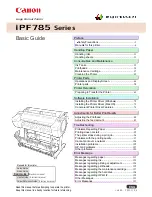
Kyocera Intelligent Colour Technology (ICT)
ICT has three components: High-Speed Data Processing, High Speed Image
Processing, and High-Image Quality.
High-Speed Data Processing
DDR SDRAM technology is the newly adopted memory method. Its data
transfer speed is twice as fast as existing SDRAM technology, which
contributes to the improvement of total print performance.
High Speed Image Processing
Improved RGB to CMYK colour conversion and image generation speed
allows faster processing of files containing colour images.
High-Image Quality
Documents containing a mixture of text, graphics, charts, graphs, and
photos are printed clearly and precisely because each unique page element
is processed independently to provide the highest image quality possible.
Environment Adoption Stabilisation System (EASS)
Maintaining consistent image quality when utilising Advanced Beam Array
technology is effortless with EASS. Fluctuations in environmental conditions
such as temperature and humidity can cause image quality to “drift” resulting in
the same image appearing differently when printed on two separate days.
Kyocera includes sensors and developed unique technology to adjust toner
concentration levels within the FS-C5020/30N, virtually guaranteeing consistent
image quality regardless of environmental conditions.
Oil-Less Fusing
Newly developed polymerised toner eliminates the need for an Oil Roller, which
reduces cost per print and service calls.
Colour Matching
With the FS-C5020N and FS-C5030N you can satisfy Colour matching
requirements by using the Colour Tab in the KX Driver. (covered later in this
guide) This function offers the ability to output a variety of ink and monitor
simulations.
Colour Control
For those who want to make more refinements to image quality, users have the
ability to make setting adjustments to Hue, Lightness, and Saturation within the
KX Driver. In addition, Colour Reproduction Modes such as Picture Image, Text,
Chart/Graphic, and four automatic modes can be specified within the Driver.
Automatic Colour Calibration
Another tool ensuring optimum image quality is Automatic Colour Calibration.
Calibration takes place when the FS-C5020/30N is powered on, when the
engine has been inactive, and during long print runs to maintain colour quality
and consistency. It can also be user requested at any time from the Control
Panel. When the FS-C5020/30N is calibrating, a Control Panel message states:
“Please Wait (Calibrating)”. The process is very brief, and is done to ensure that
the quality of Page 1 is as good as Page 3,001.
FS-C5020N and FS-C5030N Product Guide
FS-C5016N
- 20 -
FS-C5020N and FS-C5030N Technology
Summary of Contents for FS-C5020N
Page 1: ...Product Guide FS C5020N and FS C5030N...
Page 4: ...4 This page intentionally blank...
Page 8: ...8 FS C5020N and FS C5030N Product Guide This page intentionally blank...
Page 18: ...18 FS C5020N and FS C5030N Product Guide This page intentionally blank...
Page 26: ...26 FS C5020N and FS C5030N Product Guide This page intentionally blank...
Page 38: ...FS C5020N and FS C5030N Product Guide FS C5016N 38 This page intentionally blank...
Page 48: ...FS C5020N and FS C5030N Product Guide FS C5016N 48 This page intentionally left blank...
Page 50: ...FS C5016N FS C5020N and FS C5030N Product Guide 50 This page intentionally left blank...
















































